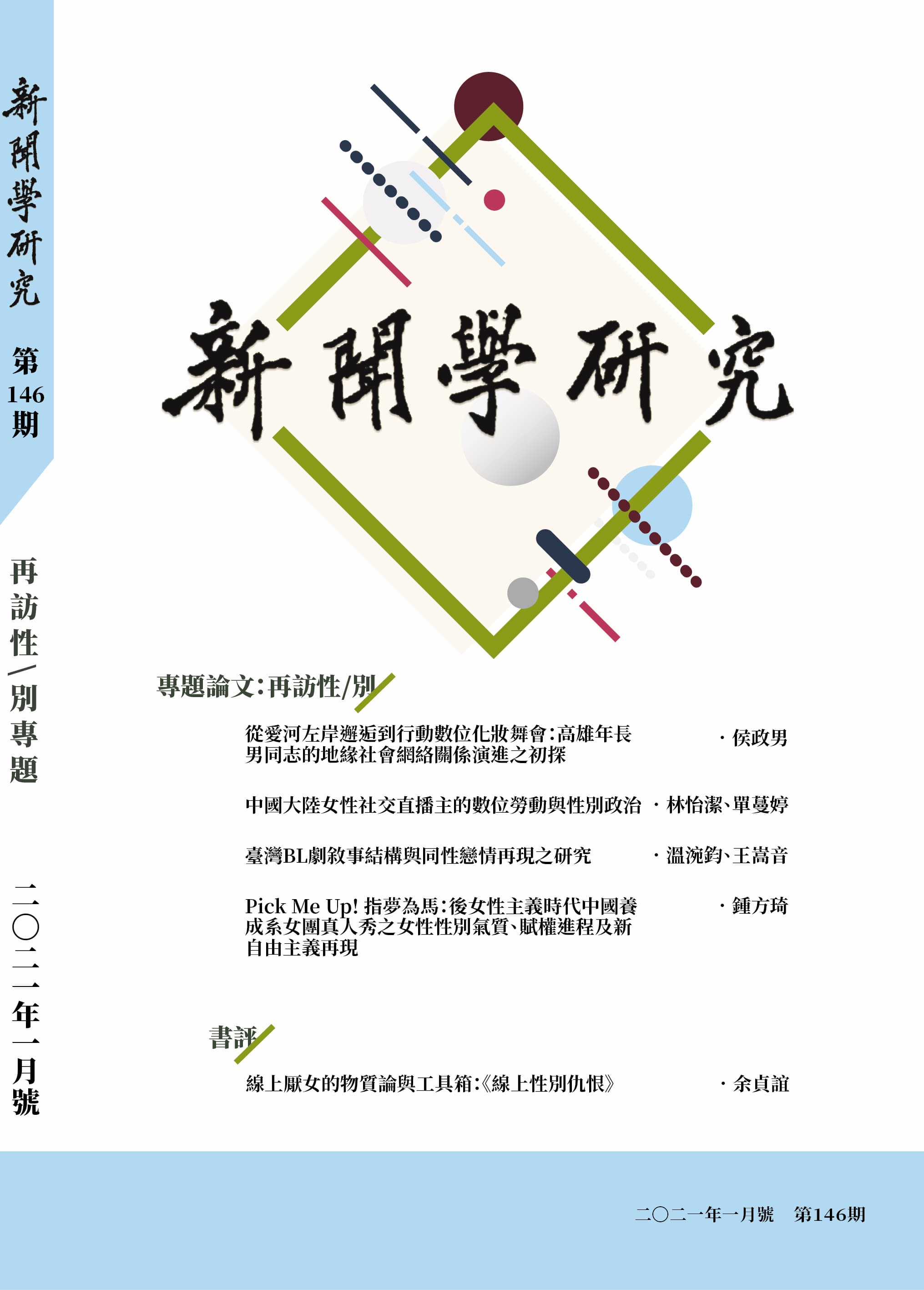前期出版
前期出版
頁數:97﹣143
臺灣 BL 劇敘事結構與同性戀情再現之研究
The Narrative Structures and Representation of Homosexuality in Taiwanese BL TV Dramas
專題論文
作者(中)
溫涴鈞、王嵩音
作者(英)
Wan-Chun Wen, Song-In Wang
關鍵詞(中)
同性戀情再現、敘事分析、符號學分析、臺灣 BL 電視劇
關鍵詞(英)
narrative analysis, representation of homosexuality, semiotic analysis, Taiwanese BL TV drama
中文摘要
作為 BL(Boy’s Love)文本之一,BL 電視劇近年來頗受到觀眾喜愛,尤其是在亞洲地區。本研究以六部 2017 至 2019 年播出之臺灣 BL 電視劇文本為分析對象進行分析。在方法上採用敘事分析與符號學分析為分析策略,依照故事中的角色、情節、場景等面向對文本進行解構、從中找出敘事公式。本研究同時分析影像、聲音與對白符號,進一步觀察文本中再現的同性戀情樣貌。
研究結果顯示 BL 劇雖然是新興的特殊題材,但其體裁仍屬於電視劇敘事框架,與既有的電視劇敘事結構相符。BL 劇除了是成功地以商業價值為導向的流行文化商品外,同時再現了超越性別規範的理想愛情,展現「愛」並沒有界線的核心概念,由此建立一種性別友善之論述。但 BL 劇卻也將同志在生活中可能會面臨的掙扎、阻礙、衝突等問題淡化,甚至部分劇中仍然存在強攻/弱受的形象,無形中可能強化了閱聽人對同性戀情的刻板印象。
研究結果顯示 BL 劇雖然是新興的特殊題材,但其體裁仍屬於電視劇敘事框架,與既有的電視劇敘事結構相符。BL 劇除了是成功地以商業價值為導向的流行文化商品外,同時再現了超越性別規範的理想愛情,展現「愛」並沒有界線的核心概念,由此建立一種性別友善之論述。但 BL 劇卻也將同志在生活中可能會面臨的掙扎、阻礙、衝突等問題淡化,甚至部分劇中仍然存在強攻/弱受的形象,無形中可能強化了閱聽人對同性戀情的刻板印象。
英文摘要
Boy’s Love (BL) TV drama is a genre depicting homosexual love between two male characters and has become very popular in Taiwan. The present study thus examines the narrative structures of six Taiwanese BL TV dramas broadcast from 2017 to 2019 by employing dramatic structural methods developed by Vladimir Propp and using semiotic analysis to uncover the implied homosexuality represented in these six dramas. The first research objective is to analyze the narrative structures of Taiwanese BL TV drama and to investigate if they are the same as those of traditional TV drama. The results of narrative analysis show that all the characters in the six BL TV dramas could be resolved into six abstract character functions (villain, dispatcher, helper, princess, donor, and hero), except for the character function of the false hero, and that the plot structures perfectly follow the traditional sequences of narratemes: initial situation, counteraction of heroes, resolution of problems, and happy ending. Findings also show that BL TV dramas attempt to create a utopia where romance takes precedent over the gender of the subjects, creating a homonormative discourse. While this may create a gender-friendly discourse, BL dramas also downplay the struggles,
obstacles, and conflicts that gay people may face in real life, such as the problem of self-identity, relationships with conservative parents, and peer pressure. Some dramas also emphasize differences in the role-playing of “seme” (“the man”) and “uke” (“the woman”). The above-mentioned features of Taiwanese BL TV drama could thus reinforce the stereotypes of homosexuality. This paper also discusses implications and recommendations for future research.
obstacles, and conflicts that gay people may face in real life, such as the problem of self-identity, relationships with conservative parents, and peer pressure. Some dramas also emphasize differences in the role-playing of “seme” (“the man”) and “uke” (“the woman”). The above-mentioned features of Taiwanese BL TV drama could thus reinforce the stereotypes of homosexuality. This paper also discusses implications and recommendations for future research.
1940次下載



